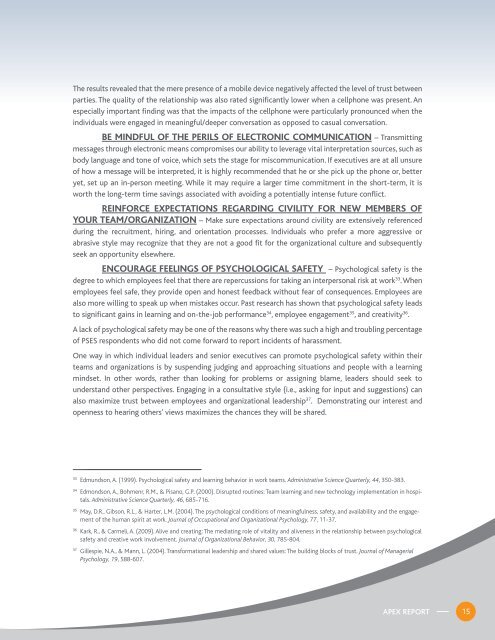CIVILITY MATTERS!
civility report - eng
civility report - eng
Create successful ePaper yourself
Turn your PDF publications into a flip-book with our unique Google optimized e-Paper software.
The results revealed that the mere presence of a mobile device negatively affected the level of trust between<br />
parties. The quality of the relationship was also rated significantly lower when a cellphone was present. An<br />
especially important finding was that the impacts of the cellphone were particularly pronounced when the<br />
individuals were engaged in meaningful/deeper conversation as opposed to casual conversation.<br />
BE MINDFUL OF THE PERILS OF ELECTRONIC COMMUNICATION – Transmitting<br />
messages through electronic means compromises our ability to leverage vital interpretation sources, such as<br />
body language and tone of voice, which sets the stage for miscommunication. If executives are at all unsure<br />
of how a message will be interpreted, it is highly recommended that he or she pick up the phone or, better<br />
yet, set up an in-person meeting. While it may require a larger time commitment in the short-term, it is<br />
worth the long-term time savings associated with avoiding a potentially intense future conflict.<br />
REINFORCE EXPECTATIONS REGARDING <strong>CIVILITY</strong> FOR NEW MEMBERS OF<br />
YOUR TEAM/ORGANIZATION – Make sure expectations around civility are extensively referenced<br />
during the recruitment, hiring, and orientation processes. Individuals who prefer a more aggressive or<br />
abrasive style may recognize that they are not a good fit for the organizational culture and subsequently<br />
seek an opportunity elsewhere.<br />
ENCOURAGE FEELINGS OF PSYCHOLOGICAL SAFETY – Psychological safety is the<br />
degree to which employees feel that there are repercussions for taking an interpersonal risk at work 33 . When<br />
employees feel safe, they provide open and honest feedback without fear of consequences. Employees are<br />
also more willing to speak up when mistakes occur. Past research has shown that psychological safety leads<br />
to significant gains in learning and on-the-job performance 34 , employee engagement 35 , and creativity 36 .<br />
A lack of psychological safety may be one of the reasons why there was such a high and troubling percentage<br />
of PSES respondents who did not come forward to report incidents of harassment.<br />
One way in which individual leaders and senior executives can promote psychological safety within their<br />
teams and organizations is by suspending judging and approaching situations and people with a learning<br />
mindset. In other words, rather than looking for problems or assigning blame, leaders should seek to<br />
understand other perspectives. Engaging in a consultative style (i.e., asking for input and suggestions) can<br />
also maximize trust between employees and organizational leadership 37 . Demonstrating our interest and<br />
openness to hearing others’ views maximizes the chances they will be shared.<br />
33<br />
Edmundson, A. (1999). Psychological safety and learning behavior in work teams. Administrative Science Quarterly, 44, 350-383.<br />
34<br />
Edmondson, A., Bohmenr, R.M., & Pisano, G.P. (2000). Disrupted routines: Team learning and new technology implementation in hospitals.<br />
Administrative Science Quarterly, 46, 685-716.<br />
35<br />
May, D.R., Gibson, R.L., & Harter, L.M. (2004). The psychological conditions of meaningfulness, safety, and availability and the engagement<br />
of the human spirit at work. Journal of Occupational and Organizational Psychology, 77, 11-37.<br />
36<br />
Kark, R., & Carmeli, A. (2009). Alive and creating: The mediating role of vitality and aliveness in the relationship between psychological<br />
safety and creative work involvement. Journal of Organizational Behavior, 30, 785-804.<br />
37<br />
Gillespie, N.A., & Mann, L. (2004). Transformational leadership and shared values: The building blocks of trust. Journal of Managerial<br />
Psychology, 19, 588-607.<br />
APEX REPORT 15


